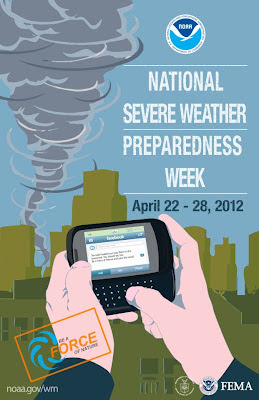Category:
NOAA and FEMA partner to Build a Weather-Ready Nation
April 24th, 2012 by Irene MilesRecent News
- Tomas Höök signing off as Illinois-Indiana Sea Grant director this summer
- Illinois-Indiana Sea Grant welcomes Stuart Carlton as the program’s new director
- Four Illinois and Indiana educators will set sail on Lake Michigan aboard EPA’s research ship
- Join IISG as a new pollution prevention outreach assistant
- Beach season means it’s time for lifesaving Lake Michigan water safety resources
IISG Instagram
The Shipboard Science Immersion educators worked together to simulate sonar mapping and uncover the secrets of a mystery seabed, just like real underwater archaeologists!
This hands-on lesson mirrors the work of Dr. Ashley Lemke from University of Wisconsin Milwaukee who studies paleo landscapes below Lake Michigan by collecting sonar data from lakebeds. Experiences like these can be shared with youth to spark curiosity and connect them to real-world science in action.
#LakeMichigan #GreatLakes

15 educators from 7 Great Lakes states have boarded the R/V Lake Guardian for a week of science on Lake Michigan!
Day one was all about meeting fellow educators and the science team from the @epa_greatlakes, @uwmilwaukee, and @purduefnr, and getting shipboard safety training.
This hands-on program, supported by the Great Lakes Restoration Initiative, helps bring Great Lakes science into classrooms and builds educator-scientist partnerships.
Follow along as we explore water quality, food webs, and even underwater archaeology!
#GreatLakes #LakeMichigan

Ready for a party? Join us on the newly-expanded Wild Mile for a celebration of our urban waterways and thriving park spaces. Enjoy local beer, food trucks, and an outdoorsy prize drawing while learning about local environmental nonprofits and volunteer opportunities! This event is free and fun for all ages!
The block party is rain-or-shine, and we`ll only cancel in the case of hazardous weather!
This year’s community partners include @Openlands, Current Water, @chicago_enviro, @cleanupclub_chicago, @chicago_birder, Blazing Star School, @cubillinois, Friends of the Bloomingdale Trail, @chicagoshapers, @reducewastechicago, Southern Utah Wilderness Alliance, and @honeycombproject!
Learn more at the link in bio.

📢 Show Your Support for Sea Grant! 📢
Continued federal funding for Sea Grant in FY26 is crucial, and we need your help to demonstrate the nationwide support for these essential programs.
🖊️ Sign the letter urging Congress to continue funding Illinois-Indiana Sea Grant and all 34 state Sea Grant programs:
🔗 https://forms.gle/7sPGHGyh8j8a7vfGA or link in bio

Categories
- Aquaculture
- Aquatic Invasive Species
- Buoys
- Climate Ready Communities
- Director's Blog
- Education
- Featured
- Fellowships
- Fisheries
- Funded Research
- Funding
- Great Lakes Cleanup
- Great Lakes Data
- Healthy Waters
- Internships
- Jobs
- K-12 Education
- News
- Photos
- Program
- Recreation & Tourism
- Resources
- Sea Grant Scholars
- Stormwater & Green Infrastructure
- Sustainable Community Planning
- The Helm
- Uncategorized
- Video
- Water Resource Economics

